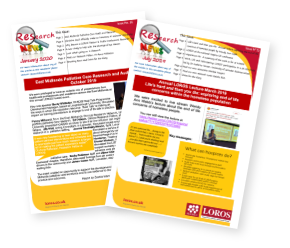Training at LOROS
At LOROS we offer a wide range of training in palliative and end of life care courses. We also offer bespoke training that can be delivered in your place of work to meet your requirements.

The training we provide
Our training courses include:
Unless stated please book online; if online booking is not an option please contact one of the education team via email LPDC@loros.co.uk or telephone (0116) 231 8455
“Couldn’t be improved, it was the best end of life care session I've attended" – Delegate, Symptom Management at the End of Life
Delegate - Symptom Management at the End of Life
My understanding of the different ways people deal with grief / bereavement has grown enormously, as well as having gained better insight into how my attitude or words can influence a customers behaviour – Delegate - Having Conversations about Death and Dying
Delegate - Having Conversations about Death and Dying
This study day for registered health care staff aims to improve skills in providing compassionate personalised care for people in the last year of life.
To Include:
· Understanding Empathy, Congruence and unconditional Positive Regard, .
· Recognition of Psychological Needs/general psychological support.
· Understanding personal limitations of what you hear, and when to refer
· Using Reflective skills for self-care and self-awareness.
This End of Life Care training is a bespoke course for Foundation Year 1 Doctors delivered via ECHO Zoom
This 2-day interactive workshop will help you to develop advanced communication skills for dealing with complex situations in practice.
This one-day intermediate level communication skills study day aims to increase confidence and skills in having conversations about dying.
This study day provides health and social care support workers with an introduction to supporting people and those important to them towards the end of life.

Did you know: we conduct research with patients, carers, universities and NHS organisations
